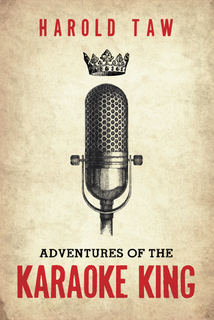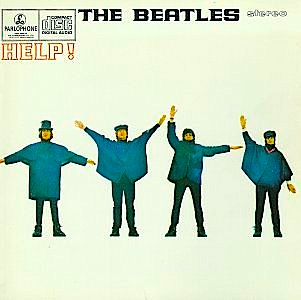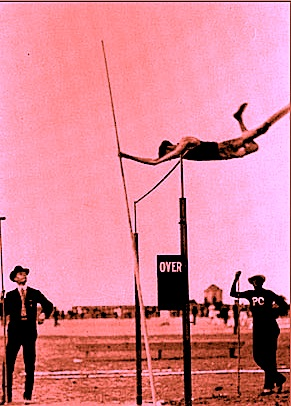
Had you noticed, campers, what a high percentage of the examples I’ve used throughout this series of prose that tends to irritate professional readers — such as agents, editors, contest judges, and our old nemesis, Millicent the agency screener — has consisted of dialogue? That’s not entirely coincidental: as we have seen in recent posts, an astoundingly high percentage of dialogue in submissions just seems to lie there on the page, not so much moving the plot along, intensifying the central conflict, or helping enrich the reader’s understanding of the characters as taking up space.
Why? Because in real life, most dialogue exists for its own sake — and many writers are enamored in, as ’twere, holding the mirror up to nature.
That doesn’t mean, though, that just transcribing what actual human beings might actually say if they were transported into a fictional situation would make good reading. Frankly, quite a bit of what happens in real life would not make good reading. Virginia Woolf may well have been right when she wrote, “Fiction must stick to the facts, and the truer the facts, the better the fiction,” but has anybody ever met a reader who longs for nothing more than a transcript of reality?
Let’s face it, reality is not a particularly good storyteller. It has neither taste, discretion, nor even a sense of the plausible.
Take, for instance, the photograph above. When I first spotted this wacky crow outside my studio window, I feared he had a broken neck. Ten minutes later, however, he startled me horribly by switching to this dignified pose:

Followed closely by this equally majestic stance:

He seemed to find this last position the most comfortable: he remained like that for the better part of an hour, squawking irritably at passing birds, presumably because they did not spontaneously drop food into his waiting gullet.
Now, nobody can tell me that this behavior would be plausible if it were presented as fiction, or even memoir. Oh, there’s no doubt that this series of events actually happened: I saw it with my own weary eyes (as, apparently, did my camera). Several readers wrote in the last time I ran these photos –hey, knowing a good metaphor when I see one is part of my job — to tell me that the gymnastics above are quite normal bird behavior; no birds were harmed in the production of these photographs.
But just because something happens in real life doesn’t mean it will come across as realistic on the page. Come on, admit it: no matter how well I told this story, you wouldn’t have believed the rubber-necking crow had I not produced photographic evidence. Nor would piling on specific details necessarily have helped the description: had Tweetie been a small bird, of a size and shape one might expect from a fledgling recently tumbled from a nearby nest, this behavior might have made more sense, but our hero was behemoth, a giant among crows.
Tweetie should, in short, have known better than to act in this extraordinary manner, if he wanted me to write about him plausibly. And so should protagonists who go around asking other characters questions.
I can already feel some of you smiling. Yes, long-time members of the Author! Author! community, I am about to take you on a wild ride through my least favorite type of dialogue and thus favorite kind of expendable text: the unconvincing interview scene.
Frankly, these drive me nuts — and I’m not the only professional reader who feels this way about them.
Don’t get me wrong — interview scenes in and of themselves are not inherently annoying. Fortunate, given that one character trying to elicit information from another is one of the most common type of dialogue scene. The problem arises when the protagonist is a really, really poor interviewer.
Oh, you may laugh, but you would be surprised at how often Millicent the agency screener grinds her teeth over this kind of dialogue. A protagonist who doesn’t ask good questions — or necessary follow-up questions — can slow a novel, memoir, or creative nonfiction book to a limping crawl.
Already, a forest of hands has shot up out there in the ether. “But Anne,” many a well-intentioned constructor of dialogue protests, and who can blame them? “Why does it matter how skilled a questioner the protagonist is, unless s/he is a journalist of some sort? My main character is Everyman/woman/bird: part of his/her/its complicated appeal is that he/she/it has no specialized knowledge or skills at all. That way, every reader can identify with George/Fiona/Tweetie.”
The short, snide answer to that, should you care to know it, is that most Everyman characters have a very specific point of view and skill set: their authors’. That means the knowledge base and skill set is not only culturally-specific, but rooted in the worldview of a particular social class, gender, and even region of the country. While there’s nothing wrong with that — specificity is almost always more interesting for the reader than generality — an astonishingly high percentage of these protagonists share an apparent reluctance to ask questions germane to the plots they inhabit. Or even ones that any reasonably intelligent person in that situation might think to ask.
No, they prefer to sit there, beaks ajar and aloft, waiting for the necessary tidbits to tumble into their gullets. While yours truly, Millicent, and other souls lucky enough to read manuscripts for a living drum our fingers, tap our feet, stare out the window, and indulge in other clichés geared toward indicating boredom.
Move on with it already, Tweetie. The twisted-neck thing was cute the first time it happened, but you can hardly expect it to entertain readers for an entire book.
Unfortunately for passive protagonists everywhere, interview scenes are indigenous to almost all fiction and quite a bit of memoir and creative nonfiction as well. Many, many, MANY novel plots require their protagonists to learn something that they do not already know — and, more importantly, that the reader does not already know. Who killed the Earl of Cheswick, for instance. Why everyone in Anytown, USA avoids that creepy-looking house at the end of Terror Lane. Or why so many people are interested in that darned ugly Maltese Falcon.
Just trying to keep those bird-lovers interested.
I hear those of you who do not write mystery, horror, or suspense heaving a vast collective sigh of relief, but don’t get too complacent: anyone who writes dialogue is prone to running afoul (get it?) of this notorious professional readers’ pet peeve. How so? Well, think about it: most plots feature at least one interview scene, regardless of book category.
Few human beings currently inhabiting the earth’s crust are omniscient, after all; an extremely high percentage of plots involve the protagonist(s) trying to find something out. Queries ranging from “Does that cute boy in my homeroom REALLY like me, Peggy?” to “Where did the cattle go, Tex?” aren’t just dialogue filler — typically, they call for character-developing and/or plot-satisfying responses. In fact, it’s a fair bet that any scene that contains one character exclaiming, “What happened?” is the precursor to an in-text interview.
The big questions can be unspoken, too, of course. Why does everyone in town refuse to talk about the day the old mill burned down? Why does Uncle Mortimer limp? Why is the boss suddenly acting so standoffish? What’s in that casserole, anyway? Why don’t you love me like you used to do, when my hair’s still curly and my eyes are still blue?
In the pursuit of answers to these and other burning questions, the protagonist is, necessarily, frequently forced into the role of interviewer, trying to extract information from other characters. And those other characters may not want to cough it up. Indeed, it’s not all that uncommon for a minor character’s entire reason for being revolves around not just blurting out That Big Secret the first time somebody asks.
Which renders it something of a surprise to Millicent and myself when such characters’ first reaction to a protagonist’s walking into that crowded bar/deserved archive/long-defunct mine is to start singing like a canary. Often before the protagonist has asked a single probing question. Villains are particularly prone to such bird songs: “Before I pull this switch and send 150,000 volts through you, Patsy, perhaps you would like to know my evil plan, presumably so you will have something to chat about when you are waiting in line at the Pearly Gates. It all began seventeen years ago, when my also-evil mother…”
We all know the song, right?
Yes, this phenomenon is partially a function of insufficient character development for antagonists — you wouldn’t believe how often the bad guy’s sole motivation is that he is (wait for it) bad — as well as a writerly tendency that we have already discussed in this series, the urge to fall into clichés. (Oh, you didn’t mentally add Mr. Bond to that last villainous speech?) On a narrative level, though, protagonists often have a nasty habit of slowing down the collective search for truth by neglecting to promising lines of questioning, failing to follow up on something just said, or just plain being too polite to ask the questions the reader is dying to ask herself, but can’t.
The result? Tweetie standing there with his beak open, waiting for some passerby to drop something yummy into it.
Nor is this tendency peculiar to fiction. Memoir protagonists often avoid asking even the most relevant and obvious questions for pages, nay, chapters on end.
Of course, this, too, might well be an instance of art whipping out that mirror to nature again; we writers are not known for being big confrontation-seekers, as a group. Real life does often afford the memoirist an opportunity to change the subject.
Why, the last time I wrote about this particular manuscript megaproblem, the Fates trundled up with a wheelbarrow and dumped an excellent example right at my feet, the kind of real-life incident that novelists and memoirists alike love to incorporate into their narratives. See if you can catch the interviewing problem.
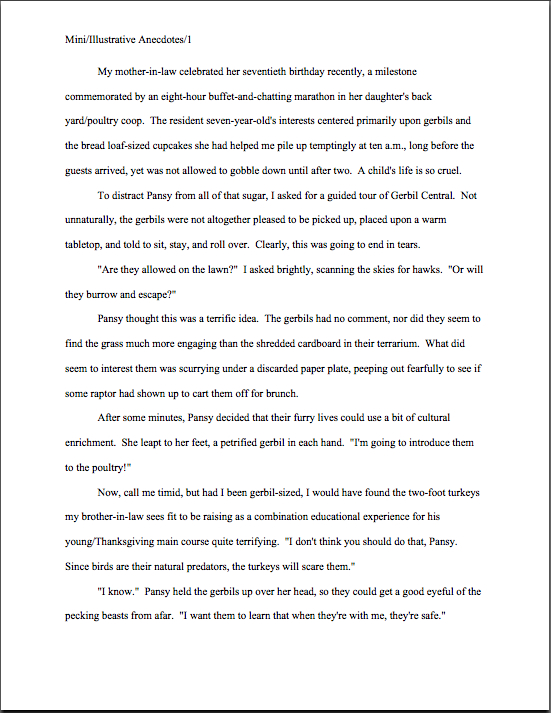
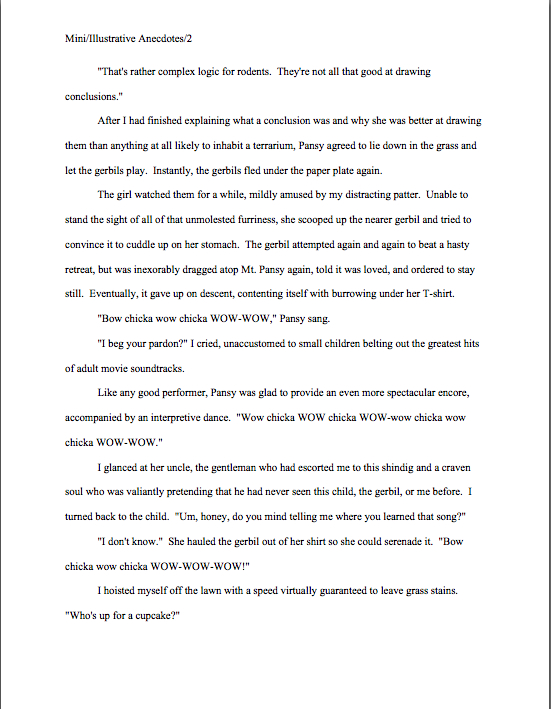
Did you catch it? If you pointed out the extremely common narrative gaffe of an actual event’s being substantially funnier to live through than to read, give yourself a gold star for the day. If, on the other hand, it occurred to you that I told the story, as so many recorders of real life do, as if any reader’s reactions would have been identical to mine in the moment, award yourself another.
Memoirs and fictionalized reality frequently suffer from both of these defects; the sheer frequency with which they turn up in submissions virtually guarantees that they would have over time joined the ranks of Millicent’s pet peeves. And why? Haul out your hymnals and sing along with me, campers: just because something actually happened does not mean that it will be interesting, amusing, or even worth recording on the page.
But these were not the only weaknesses you spotted in this narrative, I’m guessing If you blurted out something about my having told what happened, instead of showing it — an interpretive dance could cover a lot of different types of action, right? — be mighty pleased with yourself. If you said that I was attributing thoughts to Pansy that the first-person narrator of this piece could not possibly have heard without being as clairaudient as Joan of Arc, pat yourself on the back yet again.
Good job. Now that we have diagnosed these problems, what would be the single easiest way to revise this scene to render it more engaging to the reader? That’s right: by making the narrator a better interviewer.
Had I asked more insightful questions of either myself (why did the song disturb me so much? Did it have something to do with the time I heard an entire van full of 11-year-olds sing Madonna’s “Like a Virgin” at the top of their lungs on my first day as an after school program volunteer?) or of Pansy (did she realize that adults associate that particular kind of music with something she’s not supposed to know about for years to come, or had she simply heard in on a commercial? Was she trying to provoke a specific reaction in me, her uncle, the gerbil?), I could have rendered the situation more dramatic while simultaneously doing more character development. Had I written the dialogue with an eye to increasing conflict, I might even have avoided that hackneyed scene ender that we’ve all seen so often in TV shows and movies, the protagonist’s running out of the situation in order to avoid conflict that would have been interesting on the page.
Some of you are just dying to register an objection, aren’t you? “But wait — you were reproducing real-life dialogue,” all of you would-be objectors point out. “Wouldn’t the scene necessarily be less realistic if you changed it?”
In a word, no. In several words, not if I rewrite the scene well.
As I’ve observed many times before and shall no doubt again, just because something actually happened doesn’t mean it will automatically read realistically on the page. It’s the writer’s job to craft dialogue — or any scene, for that matter — so it’s plausible, not the reader’s to make allowances because the writer observed someone saying or doing what ended up on the page. Besides, real-life dialogue is often dull.
That’s especially true in interview scenes, incidentally: few standard narrative devices tend to annoy a Millicent who has been at it for a while than a protagonist — or narrator — who is a lousy interviewer.
Why might that be the case, other than the fact that lousy interviewers are as common in submissions as crows on metropolitan power lines? (Birds of a feather actually do flock together, evidently.) Let’s take a gander at the poor interviewer in his natural habitat, shall we?
“I swear,” Tyrone claimed, one hand over his heart and the other hovering over the graying head of his sainted mother, “that’s all I know. Please don’t ask me any more questions.”
Antoinette drummed her long piano-player’s fingers on the rich mahogany tabletop. Her every instinct told her that he was not telling the truth — or at least not the whole truth. The very fate of Western civilization rested upon her solving this puzzle before midnight tomorrow, and this one well-protected, diamond-encrusted lady obviously held the key.
She stood and offered her hand to the old woman. “Charming to meet you, Mrs. Power. You must come to my house for brunch sometime. I hate to boast, but I make extraordinary deviled eggs.”
Tyrone detached their clasped hands so quickly that Antoinette’s hand burned. “Must you go so soon? Here’s your coat — I’ll walk you down to the cab stand on the corner before I release the vicious dogs that prowl our estate at night to discourage post-midnight visitors.”
Antoinette fumed, but what could she do? “Goodbye,” she called back from the hallway.
“Don’t forget to sprinkle your eggs with paprika,” Mrs. Power bellowed after her. “I love paprika.”
Why might an exchange like this prove a touch irritating to a professional reader? For the same reasons that my anecdote about Pansy might strike ‘em as underdeveloped: because a poor interview scene represents a lost opportunity for intriguing conflict — rich potential for drama presented, then abandoned by the narrative for no apparent reason.
Okay, so that’s not quite fair: writers often have what they consider pretty strong reasons for rushing their protagonists away from conflict. Trying to make them more likeable to the reader by demonstrating common courtesy, for instance, or forcing them to work harder to learn the Awful Truth. Or attempting to hide said Awful Truth from the reader until your amateur sleuth’s in Chapter 38, the one that begins, “Here’s what happened…”
Or wanting to stretch the novel from 127 pages to 253. Regardless of the motive, this practice tends to render those of us who read manuscripts for a living a tad impatient.
Why? Well, in a first-person or tight third-person narrative, the protagonist is the reader’s surrogate in ferreting out information; as a reader, it’s not as though I can jump into the storyline, grab a microphone and tape recorder, and start grilling the usual suspects. After a while, an inept interviewer can start to annoy the reader simply by being a poor tour guide to the plot.
I sense some uncomfortable squirming out there. “But Anne,” I hear some of you suspense-lovers cry, “a too-good interview could give the entire plot away! What about building tension?”
You have a point, suspense-mongers: revealing the truth in slow increments is indeed one way to create suspense. It’s such a fine point, in fact, that I’m going to spend most of the rest of the post talking about how to do just that.
Before I do, however, allow me to observe that making information unavailable through the simple expedient of not having the protagonist ask anyone about it for 200 pages tends to fall very, very flat with readers. And not only professional ones like Millicent, who tends to harbor a well-founded objection to narratives that toy with her too much. Especially if that plot twist is a fairly common one, like the guy who had the bad childhood’s turning out to be the serial killer. (Who saw that coming?) Or that the model for the portrait that someone keeps breaking into the county museum to snatch is now that grand old lady who controls city politics from behind the scenes. (Ditto.) Or that the murder victim whose body we didn’t see isn’t actually dead. (Zzzz…oh, did I miss my cue?)
Even if the plot twists in question are not ones that we have seen over and over again (the couple who keep bickering eventually falls in love? Alert the media!), Millicent tends to become impatient if an obvious question is not answered during those 200 pages. She and I even have a label for this particular pet peeve: false suspense.
“Okay,” plot twist-delayers the world over concede, “I can see where a professional reader might develop a distaste for being strung along. It’s Millicent’s job to whip through those submissions quickly, after all. But artistically, I still think it’s justified — wouldn’t most lay readers regard even a couple of hundred pages of being made to guess as legitimate suspense?
Well, readers do like to second-guess what’s going to happen next, But trust me, it’s going to make your protagonist substantially less likeable if the reader keeps mentally screaming, “Ask about the elephant in the room, you fool! It’s standing right there, munching on hay with a crow perched on it’s back. Wait — where are you going? Don’t just walk away from the elephant/crow cabal!”
A professional reader is likely to react with even less sympathy, because a disproportionate percentage of submitted manuscripts create suspense by deliberately withholding information from the reader. We’re especially likely to start grinding our molars together if that information happens to be something that the protagonist already knows.
The most famous example, of course, is the sleuth from whose perspective the reader has viewed the entire case suddenly stops communicating his thoughts on the page — then gathers all of the still-living characters in the nearest drawing room (there always seems to be one handy, doesn’t there?) and announces, “You may be wondering why I asked you all here…”
Darned right we’re wondering — the reader wants to know why you suddenly withdrew your confidence from him, Mssr. Poirot.
Such scenes often beg to be flagged for revision, because they are so very hard to pace well. That’s true, by the way, even when the information being revealed is inherently exciting (“If you do not cross the bridge before sunset, giant bats will eat you, Evelyn!”), emotionally revealing (“The reason I turned to piracy is — YOU, Father!”), or just plain necessary to make the plot work (“Yes, Hubert, although I haven’t seen fit to mention it once in the course of our sixty-two-year marriage, I have always dreamed of going spelunking!”).
Why might presenting any of these plot points present pacing problems? (Try saying that seven times fast!) When the point of a scene is for information to be revealed to the protagonist (and thus the reader), many writers become so focused upon that data’s being revealed entertainingly that they run to the opposite end of the reticence spectrum and have characters (secondary ones, usually) blurt out the necessary information practically before the protagonist asks for it.
This, too, is an interviewing problem — and one of the greatest sappers of narrative tension the world has ever known.
Many, many submissions where secrets that have been kept successfully for 25 years burst out of the mouths of the secretive practically the moment that the protagonist walks into the room. So why, the reader is left to wonder, if these secret-keepers are so willing to spill their guts to the first person to ask a direct question, has this information not been revealed before?
The apparent answer: because the plot required that it not be revealed before. And that, my friends, is never a sufficient motivation from the reader’s point of view. Or Millicent’s.
To be blunt about it, too-easy detective work makes the mystery — any mystery — seem less important. It’s hard to care much about a secret if the narrative makes it evident that the hidden information would have been laughably easy to get all along, if only someone had thought to knock on the door of the only person who actually observed that the setting of that fire a decade before that shaped the entire town’s subsequent history.
You can just imagine all of the townsfolk slapping their heads in unison behind closed doors after that perky newcomer digs up the arsonist’s name in a single afternoon: “Why oh why didn’t it occur to any of us to ask Sparky McArsonist why she kept the garage stuffed to the rafters with matches? How could we have missed so self-evident a clue?”
I can answer that, perplexed villagers: because the author didn’t want you to solve the mystery before her protagonist arrived on the scene, that’s why.
Astonishingly often, the protagonist doesn’t even need to ask a question to elicit the revelations of tremendous secrets from minor-but-essential characters. Often, all she has to do is show up, and the legendary recalcitrant loner begins singing like a Rhine maiden: “So, Mr. Bond, now that I have you tied to that chainsaw, it’s time for me to reveal my evil plan…”
Or as Tweetie might put it: where’s my breakfast?
In many instances, the protagonist is reduced to helpful nods and murmured promptings on the order of, “Oh, really?” while the imparter engages in a soliloquy so long that Hamlet himself would start looking at his watch four paragraphs into it.
A novel, the last time I checked, was not an opera: in real life, most people do not go around shouting out their deepest, darkest secrets at the top of their lungs to relative strangers. Yet when was the last time you heard an advocate of realism on the page object to the formerly mild-mannered librarian suddenly bursting into florid epic storytelling mode the instant a protagonist asks for a particular book?
What makes secrets interesting, generally speaking, is the fact that not everyone knows them. Good mysteries are hard to solve; intriguing truths are hard to dig up. In real life, it is actually rather difficult to convince folks to reveal the truth — partially because after one has lived with a lie long enough, one often starts to believe it oneself.
How’s that for an intriguing narrative possibility? Interview scenes do not need to be essentially one-sided information dumps they so often are. Instead of regarding them as just necessary exposition-through-dialogue, to be rushed through quickly, why not use the opportunity to introduce some conflict?
Or heck, if you really want to get really adventurous, some character development?
How does one pull that off? Actually, there’s a pretty simple revision trick: try making the information-imparter more reluctant to cough up the goods. This both forces the protagonist to become a better interviewer and renders the information-seeking process more difficult. Right away, this small switch will render the scene more interesting, by introducing viable (if brief) conflict between Character A (who wants to learn something) and Character B (who has very good reasons not to pass on the information).
Yes, this will probably make the scene longer, but remember, the role of a hidden truth in any narrative is not to be solved as quickly as possibly, but as enjoyably for the reader as possible. Not to mention being less like the kind of clichéd interview scenes we’ve all so often seen in TV cop dramas, where the most common interview technique consists of:
(a) asking the suspected criminal/accomplice/victim-who-turns-out-to-be-in-on-it direct questions,
(b) instead of asking follow-up questions, threatening him/her/the accomplice if the interviewee doesn’t instantly blurt out what the interviewer wants to know (what used to be known in old pulp mysteries as “singing like a canary”),
(c) if no blurting occurs, the interviewer’s stomping off in a huff to pursue other clues, thus prematurely ending a potentially interesting conflict.
Yes, there are probably real-life police officers who interview this way, but I can’t believe that they’re very good at their jobs. And even if they are, would reproducing this kind of dialogue in every interview situation be compelling in a book? Probably not.
Again, perish the thought that this basic principle applies only to mysteries. Let’s take a look at the interviewing strategy my narrator took vis-à-vis young Pansy:
(a) Auntie asks Pansy where she learned that, um, charming little ditty.
(b) Upon not receiving an adequate explanation, Auntie does not ask follow-up questions, but instead
(c) scurries off, embarrassed, to score some cupcakes, thus prematurely ending a potentially interesting conflict.
In real life, of course, it’s not all that surprising that someone might side-step this particular conflict. I’m not, after all, one of the girl’s parents; I have no idea how they might or might not have explained the musical scoring choices of adult filmmakers to their offspring. As a protagonist in a novel or memoir, however, slinking away from conflict just because it might prove uncomfortable is about the most boring choice I could have made. And pulling away from the story rather than following it into some of the many, many horrifying possibilities (the child’s next bravura performance could take place in school, for instance. Or in church. Or immediately after singing the National Anthem before her Little League game.)
Even if I chose not to take the narrative down any of those roads, admit it: you would have liked that story to end with my telling you how and where Pansy learned the song, wouldn’t you? Or that you wouldn’t have liked me — in the story, at least — to have asked some follow-up questions? Or that as a reader, it doesn’t annoy you just a little bit to know that I did in fact learn the answer, but I’m just not telling you what it was?
Take a page from the time-honored pirate’s manual: make your treasures hard to dig up, and don’t have your protagonist walk away from potentially interesting interview subjects at the first sign of resistance. The more difficult it is for your protagonist to ferret out the truth, the more engaged the reader will be in the search process.
Or, to put it another way: go forage for yourself, Tweetie. And keep up the good work!

